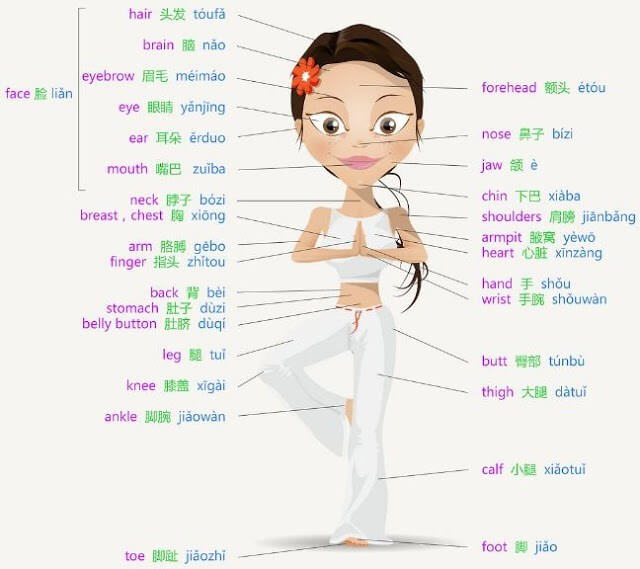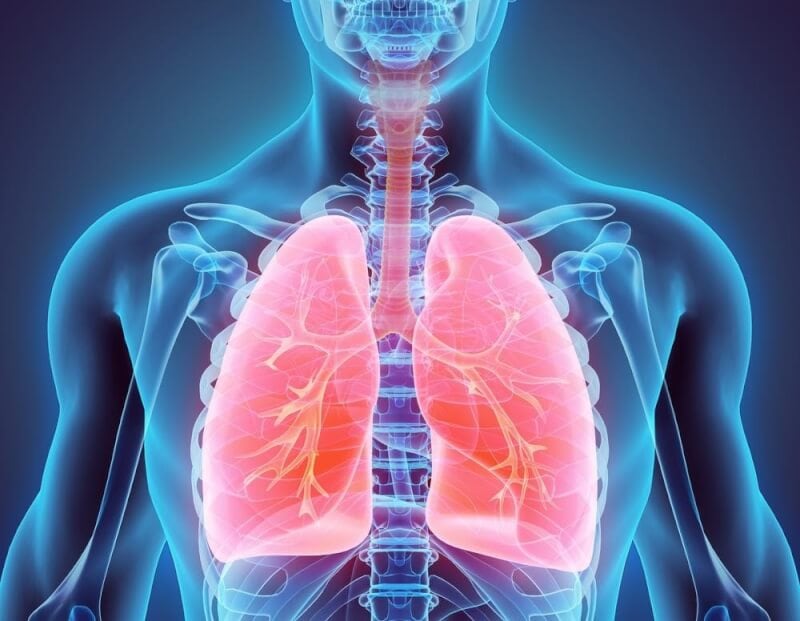Remember learning simple body parts like singing “head, shoulders, knees and toes?” This song is extremely familiar to those who learn foreign languages. I just wish that my teacher had used the Chinese version of the song to inculcate those terms in my head when I was learning Mandarin. Ah well, what needed to be done is done.
If you are a beginner in Mandarin Chinese, songs in Chinese are great for learning basic body parts. But if you're ready to get to know the rest of the body, maybe explore the insides of the body, then you've come to the right place.
+ Note: Consult the Latest Chinese Translation Quotation
Why do you need to know body parts in Chinese?
To describe your aches and pains when you were in the hospital
Let's face it. It's silly to point out where it hurts, especially as an adult.
Communicating through translation apps is also tedious and sometimes lousy; So why not make things easier by learning body part words in Chinese? In addition to learning some Chinese medical terms, knowing the different parts of the body in Chinese also makes sense when you have a medical emergency or need to visit a doctor in one place. Chinese.
More specifically when you are at the spa
You can easily point your hand or foot when you want a massage. But let's say you want a full body massage, be it avoiding calves or feet because of injury, sensitivity or some other reason.
It would be great if you could explain everything in Chinese. However, knowing at a minimum, “I don't want…” or 不要 (bùyào) + saying body parts in Chinese, this sentence is enough for the native staff to adjust the services. spa of your choice.
To get your flirting
You can refer to your significant other using endearing phrases like (lǎo pó – beloved wife), calling your lover (shuái – handsome), but feel free to flirt with way of complimenting certain body parts, of course, without being offensive.
You can say something like 你 的 眼睛 很美。 (nǐ de yǎnjīng hěn měi.) – Your eyes are beautiful.
To speak and understand slang
Think about all the body idioms we have in English. Hot temper. Coldly. Delight. Have to improvise. Insult someone.
There's a whole list of body part slang words in English and it's no different in Mandarin or any other language. For example: if someone is always asking others for information because they are too lazy to look it up on their own, you can call them 伸手 党 (shēnshǒu dǎng), which literally means "ready-to-eat". Another example of body slang is 玻璃 心 (bō li xīn) which means "fragile heart, as fragile as glass", referring to someone who is overly sensitive to criticism and very compassionate. when given slightly negative feedback.
Learn more about body language
When you learn body parts in another language, you don't just memorize the translations. Knowing the vocabulary will help you access contextual information, in this case slang and body talk.
Body language varies across the globe, where a gesture that may be perfectly acceptable in one culture may be considered rude in another. We must not forget that learning a language also means learning to fit in.
+ Note: Some Other Reasons You Should Learn Chinese
Body parts in Chinese: A list of more than 60 body parts words
So how many words do you really know for body parts or 身体 (shēnt thực)?
You may have come across simple terms for basic body parts, but it's time to go beyond the basics with this extensive vocabulary list. And to make the article more interesting, we have added some expressions and slang that refer to parts of the body.
Head and neck
- (tóu) – head
- (liǎn) – face
- (tóufa) – hair
- (qián é) – forehead
- (méimao) – eyebrow
- (yǎnjīng) – eye
- (jiémão) - eyelash
- (ěrduo) – tai
- (ěrchuí) – earlobe
- (bízi) – nose
- (liǎnjiá) – ma
- (zuǐbā) – mouth
- 嘴唇 (zuǐchun) – lip
- (yachǐ) – tooth
- (shé) – tongue
- (xiàba) – chin
- (bózi) – neck
The face shows a lot of emotions. In English, we have terms like “long face” to show displeasure or disappointment and “red face” to indicate shame or anger.
Chinese also has similar expressions, with terms like (běng liǎn) which literally means "stretched face" and 脸红 (lióngnháng) which translates to "red face" to indicate blushing from embarrassment or anger. angry.
Common expressions related to the eyes are often associated with getting someone's attention.
For example, 抢眼 (qiǎngyǎn) literally means "to catch the eye" but is translated as "to catch the eye."
There is also a Chinese proverb about love, (gè huā ru gè yǎn) which means "different flowers suit different eyes", which is close to the Western adage of beauty. beautiful in the eyes of others.
Here are some other words:
- 左耳 进 右耳 出 (zuǒ ěr jìn yòu ěr chū) – left ear in, right ear out; (literally) in one ear out the other
- 毒 舌 (dúshé) – poison tongue; (lit.) a harsh critic
- 仰首 伸 眉 (yǎng shǒu shēn méi) – raise the head and stretch the eyebrows; (lit.) hold your head high
Body part
- 躯干 (qūgàn) – body
- (jiānbǎng) – vai
- 胸膛 (xiōngtáng) – chest
- (dùzi) – belly, belly
- 肚脐 (dùqí) – navel, navel
- (yāo) – waist, small in the back
- 腰胯 (yāo kuà) – hip
- (jǐbèi) – back
- (pìgu) – butt
- (yīnbù) – genitals, private parts
In fact, there are quite a few idioms that include chest and belly in Chinese, as people believe that the body is the seat of emotions.
An example would be 捶胸 顿足 (chuíxiōngdùnzú) which means "smash one's chest and stomp one's feet" to describe grief, sorrow or anguish. It's almost like the Western saying about blaming yourself for something. Other popular sayings use different synonyms for chest in Chinese.
+ Note: Top 10 Effective Chinese Learning Blogs
Hand and foot
Parts of the arm
- (pie) – arm
- (yèwō) – armpit
- (shu zhǒu) – elbow
- (qiánbì) – forearm
- (shǒuwànzi) – wrist
- (shǒu) – tay
- (shǒuzhǎng) – palm
- (shuzhǐ) – finger
- 拇指 (mǔzhǐ) – thumb; the big toe
- (zhǐjiǎ) – nail
If you complete a task that feels effortless to you, you can say it is 易如反掌 (yìrúfǎnzhǎng), or “as easy as the back of your hand”.
To describe anxiety or depression, you can use the term 扼腕 (èwàn), which literally means "twist one's wrist".
Parts of the foot
- (tuǐ) – foot
- (dàtuǐ) – thigh
- (xīgái) – knee
- 脚腕 (jiǎo wàn) – ankle
- (jiǎo) – foot
- 脚底 (jiǎodǐ) – soles of feet
- 脚跟 (jiǎogēn) – heel
- (jiǎozhǐ) – toe
- (zhǐjiǎ) – toenails
In general, movement of the legs or feet indicates extreme anger or anxiety.
If you want something more colorful or emotional than (shēngqì) meaning “angry”, you can always use (tiãojiǎo), which literally means “jump your feet”, although it really means is “stomped in rage or anxiety” or “jumped like crazy.”
Internal body parts
- (no) – brain
- (huu) – throat
- (xīn) – heart
- 静脉 (jìngmái) – tendon
- (linemill) – artery
- (fèi) – lung
- (wèi) – stomach
- (dàcháng) – large intestine
- 小肠 (xiǎocháng) – small intestine
- (gān) – gan
- (pí) – spleen
- (dǎnnáng) – gallbladder, intestines
- (shēngzhíqì) – reproductive organ
- (pángguāng) – bladder
- (niòdào) – urethra, urinary tract
- (jī) – muscle
- (gǔ) – bone
- 骨架 (gǔjià) – skeleton
- (jǐliáng) – spine, spine
Have you ever noticed that a lot of words meaning “happiness” in Chinese have 心 (xīn)? According to Chinese culture, the heart is the source of emotions, and it is really nice that many positive emotions in Chinese include characters, such as:
- 开心 (kāixīn) – happy, excited
- 心旷神怡 (xīnkuángshényí) – untroubled heart, cheerful spirit; (figuratively) relaxed and carefree
- 心醉 (xīnzuì) – drunkenness; (figuratively) fascinate, seduce
But since the heart is the source of all emotions, 心 (xīn) also appears in negative qualities, with 心急 (xīnjí) and 心切 (xīnqiè) both meaning "impatient".
+ Note: Effective Chinese Learning Youtube Channel
In Chinese, the gallbladder symbolizes courage. Gallbladder-related terms and expressions can make a huge list of their own, so we'll just list a few below:
- 胆量 (dǎnliáng) – (figuratively) the amount of the gallbladder; brave
- 胆大 (dǎn dà) – large gallbladder; (figuratively) daring
- 胆小 (dǎn xiǎo) – small gallbladder; (figuratively) timid
With this list, you will certainly be able to express yourself more easily in specific situations, making the conversation more interesting, especially when communicating with native speakers.
Contact us today for the fastest service quote and consultation.
| ✔️ See more related information: | 👉 Reliable, Cheap, Professional Swedish Translation Chuyên |
| 👉 The Most Professional Electronic Translation | |
| 👉 Quick Translation of Seafood Documents | |

Nguyen Trung Khang - Talented interpreter and translator, passionate about translation
Nguyen Trung Khang is a talented interpreter and translator, with many years of experience in the field of translation and linguistics. He graduated from Ho Chi Minh City University of Education, majoring in Linguistics in 2015.
After graduating, Mr. Khang participated in a professional interpretation and interpretation training course at the University of Foreign Languages - Hanoi National University. He achieved a high-level certificate in interpreting and interpreting, and was also awarded a master's degree in linguistics.




